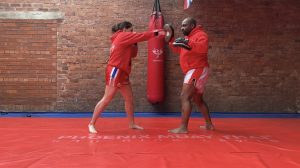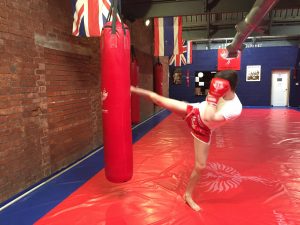Is Muay Thai Dangerous?
an original article from Muay Thai citizen
Sharing is caring!

So, you’re thinking about taking up Muay Thai. Maybe you want to get fit, learn some self-defence, or just pick it up as a new hobby. But after watching some Muay Thai fight videos on YouTube, you get a little apprehensive. “Is Muay Thai dangerous? Am I going to get all pummeled, bloodied and knocked out like those fellas in the videos?”
Is Muay Thai dangerous?
Yes, Muay Thai is dangerous. As with all competitive contact sports, there are definitely health risks involved but the keyword here being “competitive”.
Muay Thai fights in the ring can be brutal -and bloody- with flying knees, sharp elbow strikes, hard kicks to the guts, and swinging punches.
BUT! Training Muay Thai is a different thing and not as dangerous as it is made out to be. A majority of modern Muay Thai practitioners are actually non-competitive, and many do it purely for fitness and health purposes.
If you are in it because you actually want to fight in the ring, and yet worried about the dangers, then you might want to consider something like fencing where you are less likely to go out on a stretcher.
On the other hand, if you just want to pick it up for fitness, losing weight, or self-defence, we say “Welcome!” as you have most certainly arrived at the right arena!
A Brief Introduction to Muay Thai training
 You have ever seen that video of a Muay Thai fighter kicking down a banana? No worries, that’s not a norm in your typical Muay Thai class. Whew.
You have ever seen that video of a Muay Thai fighter kicking down a banana? No worries, that’s not a norm in your typical Muay Thai class. Whew.
After adequate stretching, running and skipping as part of the warm-up routine, you will be asked to perform a myriad of things.
You will learn to execute basic techniques involving punches, kicks, elbow and knee strikes, and various blocks.
These can be in the form of shadow boxing, bag work, and pad work. There will also be various strengthening exercises involved such as push-ups, sit-ups, squats and any physical routine that your instructors are able to conjure.
You do need to be prepared though, that Muay Thai practice is going to hurt to a certain extent. Bruises and slight injuries are fairly common but usually nothing to worry about.
You are more likely to be experiencing muscle soreness from time to time, even if you have been training for a while. It is a physically challenging sport but you will only get fitter and stronger as long as you continue to train.
As you progress along the path of Muay Thai -after months of hitting pads, heavy bags and the air-, you may be invited into the world of clinching and sparring. This is the natural progression of learning and this is where it freaks many people out. It begets the next question:
How dangerous is Muay Thai sparring?
If the prospects of getting hurt or injured during sparring worries you, you really don’t have to spar at all.
Sparring is a personal choice in most gyms and most definitely not included as part of a beginner’s curriculum. It is also certainly NOT compulsory.
You don’t have to be peer-pressured into sparring and you most likely won’t enjoy the experience if it is something you are not comfortable with.
That said, the level of intensity during typical sparring classes is actually quite light and the mood is usually fun. With the right sparring partners.
You’ll get the occasional spaz and tensed-up beginner who have no idea how hard they are hitting. Plus a handful of people who like to go hard during sparring.
The true objective of sparring is to practise techniques, hone your reflexes and sharpen your instincts. The objective is NOT to win or to knock out your sparring partner. The objective is also NOT to lose your cool and level up the spar into a brawl.
Sparring is not simply a step down from fighting. Sparring is a practice for improvement. It is important to have your instructor around to supervise any sparring. They should be there to correct your techniques and most of all, make sure that tempers are kept in check.
You will get hit quite a bit in sparring, and this is why sparring should only be performed with the proper protective gear. Standard protective gear includes shin guards, mouth guard, groin guards (guys seem to need these more) and in some gyms, headgear for extra protection.
These gear will protect both yourself and your sparring partner and minimize any injuries. So always remember to bring your sparring gear.
On that note, there is one thing that you shouldn’t bring into sparring and that is your ego. Best to leave it at home, or in the locker.
Keep Calm and Muay Thai
Bottom line is, you can get injured in ANY sports that you do, even a “lazy” sport like golf, and that’s a fact.
With common sense, knowledgeable instructors, the right training partners, and the right mindset, Muay Thai is a fulfilling, empowering and enriching experience. From what we’ve observed, there seems to be a higher amount of dislocation, fracture and sprain cases going on in the Brazilian Jiu-Jitsu (BJJ) gym next door.
I have had my fair share of injuries from training and sparring. Sometimes out from training for a month due to overly-enthusiastic sparring partners. But more from just general strains and sprains although the rate of sustaining them is decreasing from better fitness, form and experience.
I’m in my 40s now and never athletic my whole life. If I can do it, so can anyone else.
Hopefully, this article has put your mind at a bit more ease. Your local fight gym -if of decent quality- should most likely offer a free trial class. You can get some tips on finding the right gym Read more about finding the right gym in this article: “How to find Muay Thai gyms near you“.
So pick the phone, or drop-in at the gym, and make an appointment for a trial. Never underestimate what you and your body are capable of. If you don’t try, you just won’t realize your full potential or reap the benefits of Muay Thai.
Have fun and Chok dee!
NOTE: If you have a medical condition, you might want to get yourself medically approved or certified by your specialist before getting enrolled for Muay Thai classes. This might include -but not limited to- metabolic bone conditions, muscular disorders, respiratory or any chronic conditions. Train hard, stay safe.
